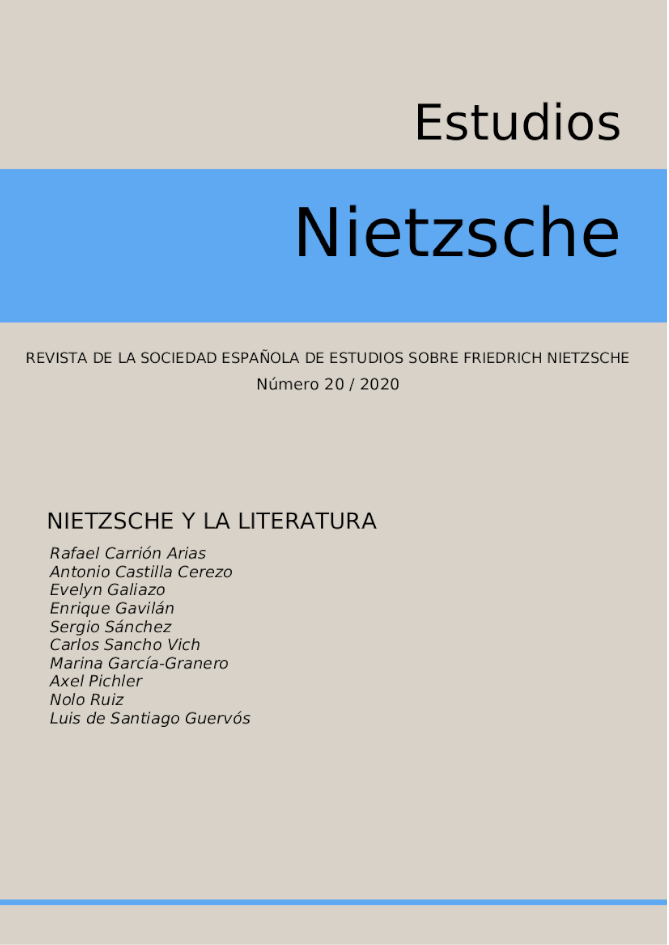Continuity in Nietzsche’s works in light of his self-view
DOI:
https://doi.org/10.24310/EstudiosNIETen.vi20.10062Keywords:
continuity, periodization, Wagnerian phase, Ecce Homo, self-presentationAbstract
The article aims to critically analyze the conventional tripartite division within Nietzsche’s philosophy that is expressed hyperbolically in the form of personification: the young Nietzsche of the Wagnerian phase, the “positivist” or “enlightened” Nietzsche, and the mature Nietzsche. I aim to contribute to the plea for continuity, paying special attention to a variety of texts in which he acknowledges the continuity of his intellectual development as a coherent unit. This significant retrospection does not indicate rupture or rejection, but recognition. The last section is dedicated to the peculiar book that is Ecce Homo, understood as a self-presentation strategy.
Downloads
Metrics
References
Brusotti, Marco. Die Leidenschaft der Erkenntnis. Philosophie und ästhetische Lebensgestaltung bei Nietzsche von Morgenröthe bis Also sprach Zarathustra, Berlin-New York: de Gruyter, 1994.
Campioni, Giuliano «Introduzione» a Nietzsche, Friedrich, Lettere da Torino, Milano: Adelphi, 2008
Conill, Jesús, El poder de la mentira. Nietzsche y la política de la transvaloración, Madrid, Tecnos, 2007, 3ª ed., segunda parte: «Nietzsche y la hermenéutica contemporánea». Jesús Conill, Ética hermenéutica. Crítica desde la facticidad, Madrid, Tecnos, 2010.
D'Iorio, Paolo, «La naissance de la philosophie enfantée par l’esprit scientifique», en Friedrich Nietzsche, Les philosophes préplatoniciens, Paris: l’Éclat, 1994, pp. 11-49.
D’Iorio, Paolo, Le voyage de Nietzsche à Sorrente, Paris: CNRS Éditions, 2015
D'Iorio, Paolo, «Système, phases diachroniques, strates synchoniques, chemins thématiques», en Paolo D’Iorio y Olivier Ponton (eds.), Nietzsche. Philosophie de l’esprit libre. Études sur la genèse de Choses Humaines, trop Humaines, Paris, Éditions Rue d’Ulm - Presses de l’École Normale Supérieure, 2004, pp. 22-36.
De Santiago Guervós, Luis Enrique, «La Correspondencia de Nietzsche: la otra cara del ‘Ecce Homo’»: Estudios Nietzsche 18 (2018), 95-113.
Esteban Enguita, José Emilio, «Del arte de guiar: apuntes sobre las introducciones de las Obras Completas en español de F. Nietzsche»: Estudios Nietzsche 18 (2018).
Fornari, Maria Cristina, «‘And so I Will Tell Myself the Story of my Life’. Nietzsche in His Last Letters (1885-1889)», en João Constâncio y Maria João Mayer Branco (eds.), As the Spider Spins. Essays on Nietzsche’s Critique and Use of Language, Berlin/Boston: de Gruyter, 2012.
Fornari, Maria Cristina, «‘Ein Kampf, der nicht der Kampf der Motive ist’. Aurora como reale punto di svolta nella riflessione nietzscheana», en Céline Denat y Patrick Wotling (eds.), Aurore, tournant dans l’oeuvre de Nietzsche?, Reims: Épure, 2015, pp. 54-63.
Fornari, Maria Cristina «Talis hominibus fuit oratis qualis vita. Nietzsche y la narración de sí»: Quaderns de filosofia 2/1 (2015), 25-38.
Gentili, Carlo, «Nietzsche, ¿político o apolítico?»: Estudios Nietzsche 12 (2012), 105-116.
Gori, Pietro y Stellino, Paolo, «‘Los dueños de la tierra, los legisladores del futuro’: Los buenos europeos de Nietzsche y la renovación cultural de Europa»: Estudios Nietzsche 15 (2015), 45-61.
Lange, Albert , Friedrich, Geschichte des Materialismus und Kritik seiner Bedeutung in der Gegenwart, Baedeker: Iserlohn, 1866.
Montinari, Mazzino, «Nietzsche contra Wagner: été 1878», en Marc Crépon (ed.), Nietzsche, col. Cahiers de l’Herne, Paris, L’Herne, 2000, pp. 237-244.
Montinari, Mazzino, «‘Aurora’ nell’opera di Nietzsche», en Opere di Friedrich Nietzsche, a cura di G. Colli e M. Montinari, Milano: Adelphi, 1964, vol. 5/1, pp-627-630.
Montinari, Mazzino, «Nietzsche und Wagner vor hundert Jahren», en Nietzsche lesen, Berlin-New York: de Gruyter, pp. 38-55.
Montinari, Mazzino, Che cosa ha detto Nietzsche, Milano, Adelphi, 1999
Nietzsche, F., Obras Completas, I-IV (OC ). Director ed. Diego Sánchez Meca. Madrid: Tecnos, 2011-2016
Nietzsche, F., Correspondencia I-VI. (CO). Director ed. Luis E. de Santiago Guervós. Madrid : Trotta, 2005- 2012.
Nietzsche, F., Fragmentos Póstumos I-IV (FP). Director ed. Diego Sánchez Meca. Madrid: Tecnos, 2006-2010.
Römer, Heinrich, Nietzsche, Leipzig: Klinkhardt & Biermann, 1921, I, p. 105 ss., y August Vetter, Nietzsche, der Verkünder neuer Ziele, Munich: Reinhardt, 1926, p. 158, citados por Richard Roos, «Les derniers e?crits de Nietzsche et leur publication»: Revue Philosophique de la France et de l'Étranger, 146 (1956), 262-287.
Sánchez Meca, Diego, El itinerario intelectual de Nietzsche, Madrid: Tecnos, 2018.
Downloads
Published
How to Cite
Issue
Section
License
As of issue 21 (2021) this journal is published only in open access (diamond route).
From that number 21, like the previous numbers published in NIETZSCHE STUDIES, they are subject to the Creative Commons Acknowledgment-NoComercia-ShareIgual 4.0 license, the full text of which can be consulted at <http://creativecommons.org/licenses/by-nc-sa/4.0 >
It is the responsibility of the authors to obtain the necessary permissions of the images that are subject to copyright.
This work is licensed under a Creative Commons Attribution-NonCommercial-ShareAlike 4.0 International License.
Copyright generates two different rights: moral rights and patrimonial rights that EJFB recognizes and respects. Moral rights are those relating to the recognition of the authorship. They are rights of a personal nature that are perpetual, inalienable, unseizable and imprescriptible as consequence of the indivisible union of the author and his/her work.
Patrimonial rights are those that can be derived from the reproduction, distribution, adaptation or communication of the work, among others.







11.png)
